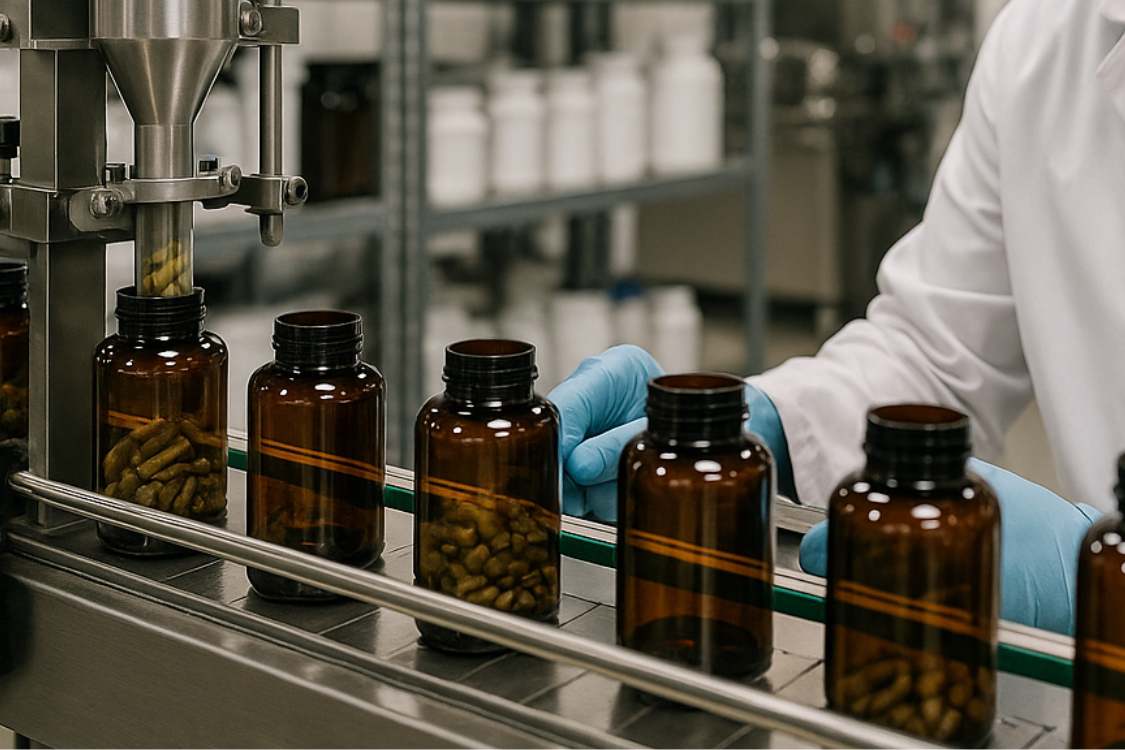Choosing the wrong supplement manufacturer can damage your brand before your first product ships. Without taking the time to prequalify supplement manufacturers, you risk delays, poor product quality, and non-compliance with good manufacturing practice standards.
Many businesses skip this step and waste time and money correcting failures that could have been avoided with a clear prequalification process.
In this guide, you’ll learn how to evaluate certifications, assess production capabilities, review compliance records, and identify red flags early to ensure you’re working with the right manufacturing partner from the start.
Table of Contents
ToggleWhat Does It Mean to Prequalify a Supplement Manufacturer?
Prequalifying supplement manufacturers means checking if they meet essential safety, quality, and compliance standards before moving forward in the selection process.
This includes reviewing their good manufacturing practice (GMP) adherence, verifying certifications, and confirming they can meet your product’s specifications and composition requirements. This step helps determine if the company has the right systems, equipment, and trained staff to support consistent manufacturing quality.
Instead of spending time on complete evaluations for every manufacturer, prequalification helps you narrow your list to only those with documented compliance, valid certifications, and the infrastructure to support reliable production.
You can then focus on those that follow established guidelines, pass regular audits, and maintain controlled and well-managed manufacturing sites. This approach protects your business from costly mistakes and keeps your product launch on schedule.

Step 1: Check Essential Certifications and Compliance Records
Start by verifying that the manufacturer complies with FDA regulations, including adherence to current Good Manufacturing Practices (cGMP) as outlined in 21 CFR Part 111. GMP compliance, required by law for dietary supplement facilities under 21 CFR Part 111, helps reduce the risk of quality and safety issues by enforcing controlled environments, documented procedures, and preventive measures.
In addition to GMP, look for third-party certifications that reflect ongoing compliance with industry standards. Certifications from organizations like ISO, NSF, or UL indicate that the manufacturer has undergone independent evaluation and meets established guidelines for manufacturing quality. To confirm the validity of these credentials, ask for direct access to documents or check regulatory databases that list verified certifications.
Red Flags in Certifications and Compliance
Watch for these warning signs when reviewing a supplement manufacturer’s certifications and compliance records. These red flags can help you quickly identify companies that may not meet your quality or regulatory standards:
- Certifications that are outdated, expired, or missing entirely
- Past violations from regulatory bodies or failed inspection reports
- Unresolved product recalls, particularly those related to contamination, mislabeling, or significant deviations from GMP standards
- Vague or inconsistent answers about GMP compliance or internal processes
- Refusal or delay in sharing compliance documents and audit results

Step 2: Research the Manufacturer’s Reputation and Track Record
A solid reputation shows that a manufacturer can deliver consistent performance across different production runs and product types. This is especially important when producing dietary supplements, medical devices, or in vitro diagnostic products, where safety, quality, and adherence to good manufacturing practices (GMP) are critical. Verify their track record using multiple reliable sources to ensure they meet prequalification requirements.
Look beyond the company’s marketing materials and check independent platforms like Google Reviews, Glassdoor, and the Better Business Bureau. These can highlight repeated issues with quality, missed deadlines, or weak internal systems. Review feedback related to inspection results, audits, or any lack of standardization in their processes for a more detailed evaluation. Poor public feedback may suggest gaps in guidelines adherence or failure to follow mandatory compliance procedures.
Industry forums and trade associations often provide deeper insight into the organization’s operations within the broader manufacturing ecosystem. Depending on the target markets, companies that distribute products internationally may be subject to various regulatory requirements, including compliance with international standards and country-specific evaluations. A well-regarded manufacturer will have evidence of successfully procured contracts, consistent specifications delivery, and strong post-market surveillance procedures to manage risk after product launch.
Questions to Ask When Researching Reputation
When checking a supplement manufacturer’s reputation, ask targeted questions about how they manage operations, maintain compliance, and support long-term business relationships. These questions can help you determine if the company meets your prequalification requirements and aligns with your quality and performance standards:
- How long has the manufacturer been active in the dietary supplement or medical devices industry, and have they consistently followed GMP guidelines?
- What do past clients or current employees say about the company’s internal systems, leadership stability, and ability to implement effective production and quality control processes?
- Is there a reliable leadership team that ensures continued compliance, manages corrective actions, and supports inspection readiness across all manufacturing sites?

Step 3: Evaluate Their Product Capabilities and Capacity
Not all manufacturing sites can handle the full range of dietary supplement formats. Ask what types of products the company specializes in—such as capsules, powders, liquids, gummies, or vitro diagnostic items—since each form may require different equipment, specifications, and standardization procedures. This is critical in determining whether the manufacturer can consistently meet your product needs.
Request details on minimum order quantities (MOQs), production lead times, and their ability to scale as demand grows. A strong manufacturer should be able to implement processes that allow for flexible batch sizes and maintain consistent quality across every stage of manufacturing. Request third-party audit reports or certifications from organizations such as NSF or UL, which can provide additional assurance of GMP compliance, recognizing that the FDA does not issue GMP certificates. This helps confirm the organization is prepared to meet your product’s composition requirements and support consistent manufacturing quality, especially when expanding into international markets, including middle-income countries.
Step 4: Assess Communication and Responsiveness Early
Effective communication is an essential indicator of a manufacturer’s ability to manage controlled processes and maintain compliance throughout the manufacturing cycle. Manufacturers who reply promptly are more likely to follow good manufacturing practices, meet submission timelines, and resolve issues with minimal delay.
Slow, unclear, or inconsistent replies may reveal deeper problems in internal systems, lack of trained staff, or poor adherence to guidelines. A simple test—like a direct email or request for specific documents—can help you evaluate their performance early. Clear communication reflects a company that is aligned with your business needs and prepared to support each stage of product development, from formulation to post-market surveillance.
Step 5: Eliminate Obvious Non-Qualifiers Quickly
A basic checklist helps you filter out manufacturers who don’t meet prequalification requirements, saving time and resources. Eliminate any company that fails to provide valid GMP or ISO certifications, lacks inspection history, or avoids sharing required compliance documents. These red flags indicate they may not be prepared to meet your quality, safety, or efficacy expectations.
Focus only on partners ready to adhere to your guidelines, maintain controlled production environments, and align with your business agreement and evaluation standards. This approach allows you to work with qualified manufacturers who can implement reliable systems, meet global prequalification criteria, and help you navigate complex regulatory expectations across countries.

Bonus Step: Set Up a Prequalification Interview or Questionnaire
Early screening through a short interview or questionnaire helps you assess a manufacturer’s readiness without committing to a full audit. This step saves time and resources while helping you identify qualified partners who meet your business and regulatory needs. Here are key questions to include:
- What is your company’s manufacturing history, and which countries do you currently serve, including any work with middle-income countries?
- Where are your manufacturing sites located, and what equipment is available for producing dietary supplements, vitro diagnostic tools, or medical devices?
- How do you ensure compliance with GMP and WHO good manufacturing practices, and what training systems are in place for staff?
- Can you describe your approach to post-market surveillance, corrective actions, and ongoing adherence to guidelines and specifications?
- What documentation can you provide regarding recent audits, evaluation results, and submission readiness for mandatory regulatory approvals?
These questions help confirm that the manufacturer can implement the necessary systems, follow required guidance, and maintain consistent quality throughout every production stage.
Why Prequalifying Supplement Manufacturers Protect Your Brand
Prequalifying supplement manufacturers helps avoid delays, compliance failures, and poor product quality that can damage your business. Checking certifications, reviewing GMP compliance, verifying manufacturing process capabilities, and confirming communication standards are all key steps to ensure your partner can meet your needs. Skipping these checks can lead to wasted resources, production issues, or damage your brand’s credibility.
Start your prequalification checklist today to save time, reduce risk, and choose the proper manufacturer from the beginning.
Frequently Asked Questions
Why should I prequalify supplement manufacturers?
Prequalifying supplement manufacturers helps ensure quality, safety, and regulatory compliance before you commit to a production partnership.
What certifications should I check when prequalifying a supplement manufacturer?
Check for FDA registration, GMP compliance, ISO certifications, and third-party testing credentials to verify manufacturing standards.
How can I tell if a supplement manufacturer has a bad reputation?
Review online feedback, industry forums, and regulatory history to identify red flags like customer complaints or compliance violations.
What happens if I skip the prequalification step?
Skipping prequalification increases the risk of delays, poor product quality, and non-compliance with reasonable manufacturing practice requirements.
Can I prequalify a supplement manufacturer just by reviewing their website?
No, you must verify certifications, request compliance documents, and evaluate their performance beyond website claims.
References
- Code of Federal Regulations. (2007, June 25). Title 21, Part 111—Current good manufacturing practice in manufacturing, packaging, labeling, or holding operations for dietary supplements. Electronic Code of Federal Regulations. https://www.ecfr.gov/current/title-21/chapter-I/subchapter-B/part-111
- Code of Federal Regulations. (2002, June 6). Title 21, Part 822—Postmarket surveillance. Electronic Code of Federal Regulations. https://www.ecfr.gov/current/title-21/chapter-I/subchapter-H/part-822
- SIS Certifications. (n.d.). ISO certification in USA. https://www.siscertifications.com/iso-certification-in-usa/




